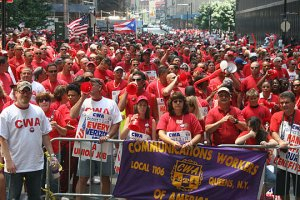Relief swept through Verizon garages and offices in the Northeast after unions at the telecommunications giant announced a settlement August 10 that buttressed health care for most workers and delivered healthy wage gains.
The three-year offer, which would cover 55,000 Communication Workers (CWA) and more than 10,000 Electrical Workers (IBEW) from Maine to Virginia, came after two strike threats in early August and weeks of worksite rallies.
The deal maintains fully paid health care premiums for current workers and retirees, a rare achievement given that 6 percent of U.S. workers have such coverage. Workers will also see nearly 11 percent raises and a cost-of-living bump over the contract’s course.
“It’s a great contract, especially in this economic environment,” said Mike Baxter, a field technician and steward at CWA Local 1101 in Manhattan.
The deal also folds about one-sixth of Verizon Business technicians nationwide into the contract, chipping at the company’s wall between union and non-union divisions. Members worry, however, that the union’s inability to organize the wireless side of the company threatens its future in telecom.
LEVERAGING TECHNOLOGY
The tentative deal could create as many as 1,900 union jobs by making temporary jobs permanent and by regaining subcontracted work on fiber optic networks soon to be built in New York and Washington. FiOS, which combines dial tone, video, and high-speed internet services, is a labor-intensive project that must finish on city-dictated timetables—giving the union leverage in this round of talks.
“The company doesn’t want to take us on with the FiOS product they’ve got rolling out everywhere,” said Joe DiFazio, a fiber optic installer and steward in IBEW Local 2222 in Woburn, Massachusetts.
In New York City, FiOS is installed with union labor, but in other areas the company uses contractors. The deal tightened rules for outsourcing, but didn’t eliminate it.
Workers credit the favorable settlement to workplace actions and rallies, including a 6,000-strong demonstration in New York City, weeks before the August 2 expiration. The contract was extended for another eight days until the unions announced a deadline for negotiations amid informational picketing, group walk-ins to work, and rolling rallies in 25 cities.
“We had been hearing for a long time that it was a done deal, but people stepped up really quickly when they needed to,” said Alison Morea, a Brooklyn field technician and member of CWA Local 1109.
With a three-year contract, the unions will get a second bite at bargaining from a strong position. FiOS installation is anticipated to take from six to eight years in urban centers.
TAKING CARE OF BUSINESS
The contract brings into the union 600 New York and New England technicians in the Verizon Business (VZB) division; rank and filers there had fought for recognition for two years. It also includes additional promises to steer new work to union members.
Non-union VZB was created when Verizon acquired MCI in 2005. The company quickly began shifting work to the non-union side, threatening to further erode union jobs in the dwindling work servicing the landline copper network.
“When Verizon bought MCI, they brought in people doing exactly the same work,” Baxter said. “We needed to bring them into the contract.”
The new members at VZB will make less than other technicians and have slightly weaker contract language. But Dave Reardon, IBEW Local 2222 business agent, said standards like pensions and fully paid health care—a $5,000 cost for non-union technicians—hand the union an organizing pitch for the remaining 3,000 to 4,000 unorganized VZB technicians nationwide.
To organize them, the unions can turn to a readymade community support model and hardened member-organizers. During their campaign, two-thirds of the now-recognized technicians signed authorization cards.
They formed an organizing committee and worked with Jobs with Justice to flood the company with demands for recognition. They sustained their momentum with constant testimonies shared on email and YouTube, making inroads to building committees nationwide.
“We’re going to use this as a springboard to organize the old-fashioned way,” said Tim Dubnau, CWA organizing director in the Northeast. The union won’t be aided by a company promise of neutrality, which is absent from the new contract.
“Neutrality doesn’t mean anything because labor law is so broken,” Dubnau said.
The unions were stung by their experience with “neutrality” at the company’s wireless unit.
They won a neutrality and card-check agreement after a strike eight years ago, but Verizon reneged, busting attempts to form unions since then, mainly by threatening to shift call center work. So the unions refocused on Verizon Business.
“With Verizon Wireless, the people are mostly sales and customer service—they’re very hard to organize,” Baxter said. “The company got their point across—if you try to organize, we’ll fight. It’s led to a lot of people backing off.”
TWO-TIER HEALTH CARE
The deal sets limits on retiree health care payments for new hires. Current worker and retirees have no such limit. Verizon workers said they assume the union conceded this point because it’s pushing for a national health care plan under a new president.
“You’re not leaving the ladder down for the next generation,” DiFazio said. If universal care doesn’t pan out, “it’s a slippery slope.”
Not many new hires have come in. Workers say the last hire in New York was in 2001.
Verizon also agreed to chip in $6 million for a joint labor-management group to advocate health care reform. Union insiders say the program’s aims probably will be modest because company and union disagree over what policy to advocate.






